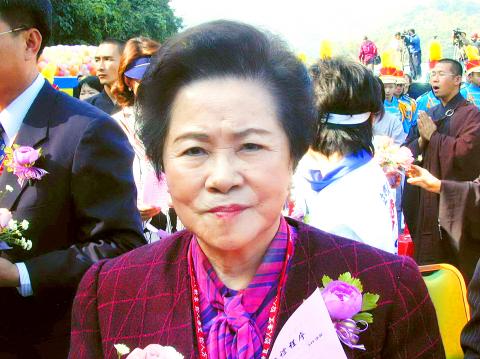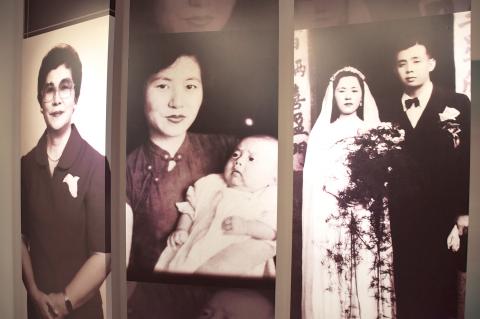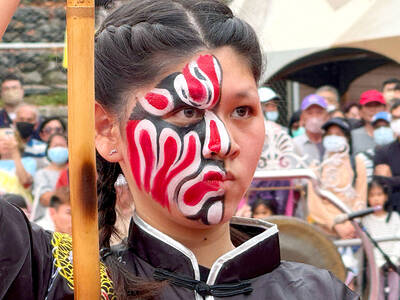Taiwan in Time: Nov. 28 to Dec. 4
Not many people’s lives change drastically when they are 38 years old.
Four months pregnant with her fifth child, Yu Chen Yue-ying (余陳月瑛) knew nothing about politics when she ran for the Taiwan Provincial Council in 1963 under the orders of her father-in-law, former Kaohsiung County commissioner Yu Teng-fa (余登發).

Photo: Hung Cheng-hung, Taipei Times
“I was not prepared at all,” she writes in the book, Memoir of Yu Chen Yue-ying (余陳月瑛回憶錄). “But the strange thing was that faced with such an important task, I did not panic.”
Yu Teng-fa , an independent politician, could not run because he had been dismissed from office and sent to prison in a scandal (Yu Chen writes that he was framed by the government). Because there were guaranteed seats for women in the assembly, Yu wanted to back a female candidate so that not all these seats would go by proxy to the ruling Chinese Nationalist Party (KMT).
“I believe that there must be competition for politics to improve,” Yu Teng-fa says in Yu Chen’s book. “I don’t think my son, daughter or daughter-in-law are better than others. It’s because I can’t find anyone brave enough to compete against the KMT.”

Photo: Su Fu-nan, Taipei Times
After much recruitment, Yu Teng-fa finally found a candidate to run for the assembly — but three days before the registration deadline, she withdrew due to family objections.
“That is why I was suddenly pushed into the role,” Yu Chen writes, as she admits that she won the top vote because of her father-in-law’s influence. But she did not expect that she would run for election and continue to win, remaining in public office for the next 30 years. And in 1985, she earned the distinction of being Taiwan’s first female county commissioner.
LEARNING ON THE FLY
Yu Chen says that her husband advised her to just stay quiet during the assemblies, but she writes that that was something she was “incapable of doing” — especially as part of the opposition.
“I was like a first-time student, I was taking notes and observing how other opposition politicians carried themselves,” she writes.
Her role model was fellow assemblywoman Hsu Shih-hsien (許世賢), who was Taiwan’s first female professor and would go on to become the country’s first female mayor in 1968.
“She always stood her ground and handled matters efficiently. She remained calm and was able to persuade people by reasoning,” Yu Chen writes. “In my 18 years as assemblywoman, I never insulted a politician. If you can’t force people to do things, you try other ways. Solving the problem is most important.”
“Through working for my constituents and seeking advice from my more experienced peers, I quickly learned the ropes of being a politician on my own,” she adds.
Yu Chen writes that she noticed the lack of true democracy in Taiwan during those days, and spoke out when the government decided to make village and borough chiefs appointed instead of elected. She also felt that the provincial government had too much power, and proposed that the provincial governor be elected as well.
She says she focused mostly on the basic problems of society, including farmers’ rights, election fraud and police abusing their power.
“I developed my political style during my first term,” she writes. “I stayed away from higher-level institutional problems, and did not try to fight ideological battles with government officials to highlight that I was part of the opposition. I worked for people’s welfare and their rights.”
Yu Chen ran for reelection in 1967 — this time on her own accord. She served a total of five terms in the assembly, then joined the legislature in 1983. She became Kaohsiung County commissioner in 1985 — following in the footsteps of her father-in-law and brother-in-law Huang You-jen (黃友仁), who were elected in 1960 and 1977, respectively.
The Yu family turned into a political dynasty as Yu Chen’s son, Yu Cheng-hsien (余政憲) succeeded her for two terms and also served as legislator and interior minister. Yu Cheng-hsien’s wife, Cheng Kui-lien (鄭貴蓮), served as a legislator and in the National Assembly.
Yu Chen’s other son and daughter, Yu Cheng-tao (余政道) and Yu Lin-ya (余玲雅), both served in the provincial assembly and as legislators.
Yu Chen left politics for several years after finishing her second term as county commissioner, but in 2000 she was named a senior advisor to then-president Chen Shui-bian (陳水扁), although she resigned in 2003 due to a financial scandal, ending a political career that was not even supposed to have happened.
Taiwan in Time, a column about Taiwan’s history that is published every Sunday, spotlights important or interesting events around the nation that have anniversaries this week.

April 7 to April 13 After spending over two years with the Republic of China (ROC) Army, A-Mei (阿美) boarded a ship in April 1947 bound for Taiwan. But instead of walking on board with his comrades, his roughly 5-tonne body was lifted using a cargo net. He wasn’t the only elephant; A-Lan (阿蘭) and A-Pei (阿沛) were also on board. The trio had been through hell since they’d been captured by the Japanese Army in Myanmar to transport supplies during World War II. The pachyderms were seized by the ROC New 1st Army’s 30th Division in January 1945, serving

The People’s Republic of China (PRC) last week offered us a glimpse of the violence it plans against Taiwan, with two days of blockade drills conducted around the nation and live-fire exercises not far away in the East China Sea. The PRC said it had practiced hitting “simulated targets of key ports and energy facilities.” Taiwan confirmed on Thursday that PRC Coast Guard ships were directed by the its Eastern Theater Command, meaning that they are assumed to be military assets in a confrontation. Because of this, the number of assets available to the PRC navy is far, far bigger

The 1990s were a turbulent time for the Chinese Nationalist Party’s (KMT) patronage factions. For a look at how they formed, check out the March 2 “Deep Dives.” In the boom years of the 1980s and 1990s the factions amassed fortunes from corruption, access to the levers of local government and prime access to property. They also moved into industries like construction and the gravel business, devastating river ecosystems while the governments they controlled looked the other way. By this period, the factions had largely carved out geographical feifdoms in the local jurisdictions the national KMT restrained them to. For example,

Shunxian Temple (順賢宮) is luxurious. Massive, exquisitely ornamented, in pristine condition and yet varnished by the passing of time. General manager Huang Wen-jeng (黃文正) points to a ceiling in a little anteroom: a splendid painting of a tiger stares at us from above. Wherever you walk, his eyes seem riveted on you. “When you pray or when you tribute money, he is still there, looking at you,” he says. But the tiger isn’t threatening — indeed, it’s there to protect locals. Not that they may need it because Neimen District (內門) in Kaohsiung has a martial tradition dating back centuries. On